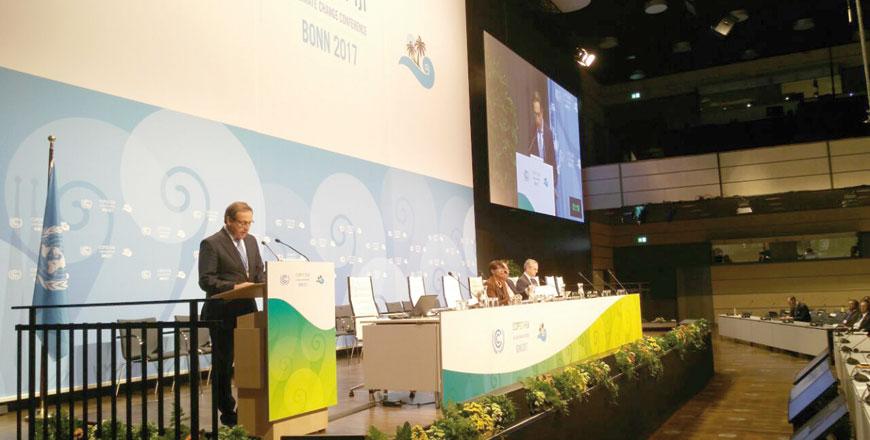You are here
Jordan voices trust in guidelines for Paris agreement
By Hana Namrouqa - Nov 16,2017 - Last updated at Nov 17,2017

Minister of Environment Yaseen Khayyat delivers Jordan’s statement at the plenary session of the COP23 in Bonn, Germany, on Thursday (Photo by Hana Namrouqa)
BONN — Jordan on Thursday expressed hope that the 23rd session of the Conference of Parties (COP23) results in deepening the level of trust between all parties to the Paris agreement, as world nations approach the 2018 deadline for adopting the agreement’s rulebook.
At the plenary session of the COP 23, Minister of Environment Yaseen Khayyat delivered Jordan’s statement, in which he underlined that “trust is the key word”, noting that, with so many countries expressing their renewed pledges to support the Paris Agreement, there is hope for achieving the desired impact.
According to the Paris agreement, adopted in 2015, there must be a balance between emissions from human activity and the amount that can be captured by carbon-absorbing “sinks” by the second-half of this century. It stipulates that developed nations “should provide” funding to help developing countries implement the costly shift to green energy and shore up their defences against climate change impacts like drought and storms, while rich countries are required to pledge $100 billion a year.
“We are approaching the vital deadline of 2018 and beyond, and these are the times where deals will be made or broken,” Khayyat stressed.
Trust will be done through the reciprocal actions of developed and developing countries, the minister said, noting that, as developing countries need to continue to provide support through financial and technical means, financial resources should be dispersed in a way that addresses the real needs of developing countries, “especially in areas of adaptation, loss and damage, capacity development and technology transfer”.
Diplomats, scientists and environmentalists from 195 nations are scheduled to attend the concluding ceremony on Friday, after two weeks of negotiations, where they will announce the operating guidelines for the Paris agreement.
The guidelines will detail how nations can reach and achieve the goals announced at the Paris Agreement, which sets a target of limiting global warming to 1.5ºC or 2ºC at the most by the end of the century.
At COP 23rd plenary session, Khayyat underscored that transparency frameworks for financial flow are also vital to identify the volume and trends of climate finance and how they can be checked and balanced to guarantee fairness and real impact.
Developing countries need to commit to a path of low emission development that responds at the same time to their own sustainable development needs. Such voluntary commitment must stem from domestic needs and priorities and be able to contribute to achieving national sustainable development goals in complete alignment with global Sustainable Development Goals.
“As a developing nation, Jordan will enhance its efforts in mitigation in the context of sustainable development, poverty eradication, and ‘Leaving No One Behind’. Through collaboration… we ought to create a reliable global financing mechanisms for climate actions. The leadership in Jordan believes that ambition and progression should be part of the elements of adaptation as well as mitigation,” Khayyat highlighted.
The minister expressed Jordan’s determination and willingness to play an essential part in the global effort to reverse the impacts of climate change, despite the extraordinary challenges it faces in light of the water and energy sectors.
“Despite such challenges, Jordan is still determined to achieve the target set by its nationally determined contributions and to continue on the path of climate friendly sustainable development,” Khayyat said.
Related Articles
BONN — Diplomats, scientists and environmentalists from 195 countries on Monday started negotiations at the 23rd session of the Conference o
BONN — Ongoing global negotiations at the Conference of the Parties (COP 23) in Bonn are “so far positive” and in favour of the demands of t
AMMAN — Jordan’s delegation at the ongoing 22nd session of the Conference of the Parties (COP22) in Marrakech, Morocco, will push for fundin















